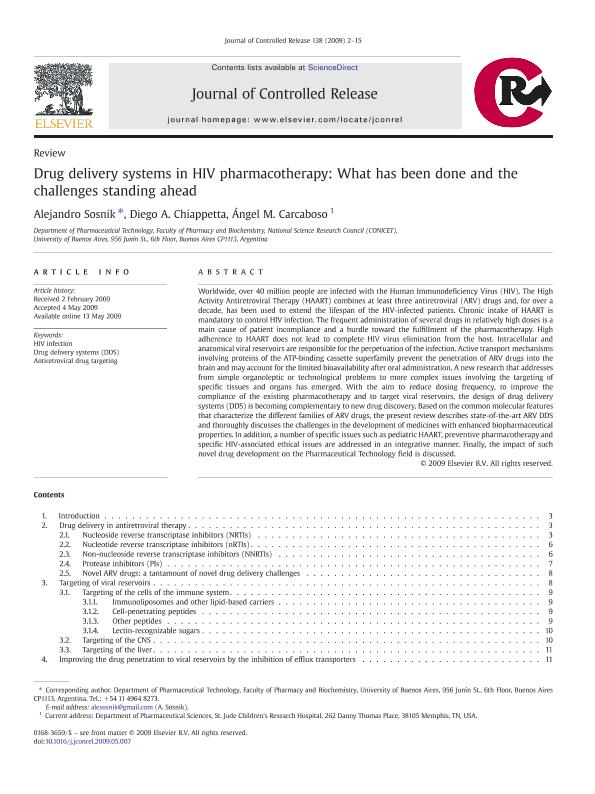Mostrar el registro sencillo del ítem
dc.contributor.author
Sosnik, Alejandro Dario

dc.contributor.author
Chiappetta, Diego Andrés

dc.contributor.author
Carcaboso, Ángel M.
dc.date.available
2022-06-30T11:00:38Z
dc.date.issued
2009-08
dc.identifier.citation
Sosnik, Alejandro Dario; Chiappetta, Diego Andrés; Carcaboso, Ángel M.; Drug delivery systems in HIV pharmacotherapy: What has been done and the challenges standing ahead; Elsevier Science; Journal of Controlled Release; 138; 1; 8-2009; 2-15
dc.identifier.issn
0168-3659
dc.identifier.uri
http://hdl.handle.net/11336/160881
dc.description.abstract
Worldwide, over 40 million people are infected with the Human Immunodeficiency Virus (HIV). The High Activity Antiretroviral Therapy (HAART) combines at least three antiretroviral (ARV) drugs and, for over a decade, has been used to extend the lifespan of the HIV-infected patients. Chronic intake of HAART is mandatory to control HIV infection. The frequent administration of several drugs in relatively high doses is a main cause of patient incompliance and a hurdle toward the fulfillment of the pharmacotherapy. High adherence to HAART does not lead to complete HIV virus elimination from the host. Intracellular and anatomical viral reservoirs are responsible for the perpetuation of the infection. Active transport mechanisms involving proteins of the ATP-binding cassette prevent the penetration of ARV drugs into the brain and may account for the limited bioavailability after oral administration. A new research that addresses from simple organoleptic or technological problems to more complex issues involving the targeting of specific tissues and organs has emerged. With the aim to reduce dosing frequency, to improve the compliance of the existing pharmacotherapy and to target viral reservoirs, the design of drug delivery systems is becoming complementary to new drug discovery. Based on to the common molecular features that characterize the different families of ARV drugs, the present review describes state-of-the-art ARV DDS and thoroughly discusses the challenges in the development of medicines with enhanced biopharmaceutical properties. In addition, a number of specific issues such as pediatric HAART, preventive pharmacotherapy and specific HIV-associated ethical issues are addressed in an integrative manner. Finally, the impact of such novel drug development on the Pharmaceutical Technology field is discussed.
dc.format
application/pdf
dc.language.iso
eng
dc.publisher
Elsevier Science

dc.rights
info:eu-repo/semantics/openAccess
dc.rights.uri
https://creativecommons.org/licenses/by-nc-sa/2.5/ar/
dc.subject
ANTIRETROVIRAL DRUG TARGETING
dc.subject
DRUG DELIVERY SYSTEMS (DDS)
dc.subject
HIV INFECTION
dc.subject.classification
Enfermedades Infecciosas

dc.subject.classification
Ciencias de la Salud

dc.subject.classification
CIENCIAS MÉDICAS Y DE LA SALUD

dc.title
Drug delivery systems in HIV pharmacotherapy: What has been done and the challenges standing ahead
dc.type
info:eu-repo/semantics/article
dc.type
info:ar-repo/semantics/artículo
dc.type
info:eu-repo/semantics/publishedVersion
dc.date.updated
2022-06-21T18:38:49Z
dc.journal.volume
138
dc.journal.number
1
dc.journal.pagination
2-15
dc.journal.pais
Países Bajos

dc.journal.ciudad
Amsterdam
dc.description.fil
Fil: Sosnik, Alejandro Dario. Universidad de Buenos Aires. Facultad de Farmacia y Bioquímica. Departamento de Tecnología Farmacéutica; Argentina. Consejo Nacional de Investigaciones Científicas y Técnicas. Oficina de Coordinación Administrativa Houssay; Argentina
dc.description.fil
Fil: Chiappetta, Diego Andrés. Universidad de Buenos Aires. Facultad de Farmacia y Bioquímica. Departamento de Tecnología Farmacéutica; Argentina. Consejo Nacional de Investigaciones Científicas y Técnicas. Oficina de Coordinación Administrativa Houssay; Argentina
dc.description.fil
Fil: Carcaboso, Ángel M.. Universidad de Buenos Aires. Facultad de Farmacia y Bioquímica. Departamento de Farmacología; Argentina
dc.journal.title
Journal of Controlled Release

dc.relation.alternativeid
info:eu-repo/semantics/altIdentifier/url/https://www.sciencedirect.com/science/article/abs/pii/S0168365909003010
dc.relation.alternativeid
info:eu-repo/semantics/altIdentifier/doi/http://dx.doi.org/10.1016/j.jconrel.2009.05.007
Archivos asociados
